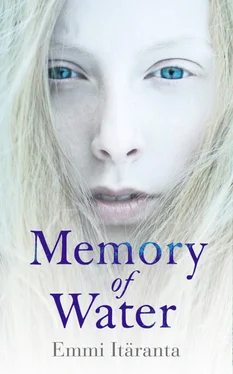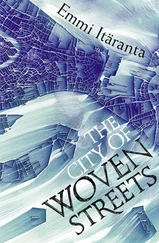The memory shifted: a leather-covered book was heavy in my hands, and on its pages words were building a bridge to the past that would have been lost otherwise. Characters drawn by the hand of a long-gone tea master pulled me in, and somehow he was still there, alive between those covers, because of what he had left behind. The sentences caught me and dragged me back from the shrouding silence.
This is my last story, and after I have recorded it on these pages, my water may run dry freely.
There are just events that people give the shape of stories in order to understand them better.
Too many stories are lost, and too few of those that remain are true.
Despite the chill emanating from the gap under the door, the wooden floor felt warm when I pressed my palms against it and slowly pushed myself up. It was like struggling against a strong wind: I had to force myself to stay in the sitting position and not give in to the fatigue that weighed on me, trying to pull me back down. The bag was only a metre or so away. I lifted my hand and reached for it, fumbled for the shoulder strap and nearly lost my balance. Eventually I managed to get a grasp of the tightly woven fabric and pull the bag towards myself. I took the tea master’s book out of the bag. The leather of the cover was soft against my fingertips.
My handwriting ran across the pages, slanted and narrow. The entries described dutifully the ceremonies and teaware used, weather, how the guests were dressed and how they behaved. Yet most of the space was taken by the log of the Jansson expedition, which I had written down from the silver-coloured discs: fragmentary, incomplete, but still true at its core. I kept turning the pages and arrived at the contents of the final disc I had listened to with Sanja one cloudy summer afternoon.
It was an account of ruin and devastation, of oceans reaching towards the centres of the continents, swallowing land and fresh water. Millions fleeing their homes, wars fought over fuel resources revealed under the melting ice, until the veins of the earth ran dry. People wounding their world until they lost it.
Then it turned into a tale of truths forged and lies told and history changed for ever: a story of books crumbling into shreds of paper mist at the bottom of the sea and replaced with the easily modifiable pod-books, until any event could be erased with a few pushes of buttons from the memory of the world, until responsibility for wars or accidents or lost winters no longer belonged to anyone.
It was a story those holding power in New Qian had sought to destroy, just like they had destroyed almost everything else about the past-world. And yet I was holding it in my hands: not the whole truth, because the whole truth never survives, but something that was not entirely lost.
I stared at the sentences on the pages and I began to understand what I needed to do.
I could stay put and wait until dust defeated water. I could let someone else tell my tale, if it would be told at all: someone who would twist it and make it unrecognisable and perhaps harness it to their own purposes. If I left my story to those who had drawn the blue circle on my door, it would no longer be mine. I would no longer be in it. I would no longer be anywhere.
I could let that happen. Or I could try to leave my mark on the world, give it my own shape.
The final third of the tea master’s book was still blank.
My legs barely carried me when I got to my feet.
Thick curtains were covering the window of my room. In the twilight I opened the tea master’s book on a new, blank page, sat down on the bed and moved the blaze lantern on the nightstand so that it cast enough light across the pages.
Ink glistened at the tip of my pen and left a star-shaped stain on the paper as I started work.
The words were slow to come at first, faint and wan in the darkness where they’d been stowed away for a long time. But as I reached for them, they began to flicker and flash and float towards me, and their shapes grew clearer. When they finally burst to the surface, bright and bold, I caught what I could and let them pour out of me.
I wrote about the hidden spring that no one else had ever written about before. I wrote about the fishfires that wavered in the sky-ocean like wide shoals of fish flashing their scales and in which you could see the forms of dragons if you knew how to look. I wrote about the plastic grave, the secrets drowned in its layers, the crushed past-objects that had once belonged to somebody and meant something, each one of them.
The sentences on the paper broke the circle of place and time. Water ran to the house from the fell again, and my father was walking in the rooms. I saw the way he would stretch his fingers after raking the rock garden and placing the rake against the railing of the veranda, and the way he would knit his eyebrows whenever he bent his head over the cauldron to count the bubbles at the bottom. My mother was sitting in her study, and I saw her stroking back her hair, lost in thought, and tilting her head as she tried to remember where she had left her pen. I smelled the lavender and mint scent of her homemade soap, and the onion stew my father would sometimes cook. I heard their footsteps: one slow and steady pair, the other more emphatic and impatient. Their voices filled the kitchen again and floated in the garden, and I wasn’t alone anymore.
I wrote about Sanja. The glow that would take over her face when she was picking out pieces one by one from the guts of a past-machine in her workshop, memorising their order and placing them neatly on the table. The way one corner of her mouth would rise a bit higher than the other when she smiled, and how she always knew what to say or not say to make me feel better. Her habit of pulling her dark hair back with a scarf, the outlines of her hands, the cracks and torn skin of her fingertips. The way her limbs looked through dark water where daylight did not reach.
Outside the sky changed and dimmed down, but inside the room it was as if shadows shrank and curled, and the book cast its own sheen, fuller and brighter than the blaze lantern. The slice of blank pages at the end grew slimmer. I summoned the spirits surrounding me and caught them between the covers with all other things lost, until I had scribbled across every last inch of paper and my wrist ached.
When I finally put the pen down and rested my forehead against the leather of the back cover, night was already diminishing outside the curtains. My body felt like an empty husk: light enough for any breeze to carry away, free of the weight of water and words.
I put on my tea master’s outfit. It was loose and soft on my skin, and I felt the unwashed scent of my own sweat on it. My socks were slippery against the wooden floor when I walked to the kitchen with the notebook in my hand. The lightweight fabric pouch was in the kitchen cupboard where I had left it. I loosened the string holding it closed and looked inside. A few spoonfuls of tea remained at the bottom, the same one I had chosen at the Kuoloyarvi market for my graduation ceremony. The scent was fainter than back then, but I could still sense the same flow in it: the moistness reviving the dust of the earth, the wind shaking the branches of all things that grew, the light wavering on water.
I lifted the final waterskin from the floor. Its small weight sloshed quietly. I placed the mouth of the skin against the metal of the tap. I spoke to it in pretty words and ugly words, and I may have even screamed and wept, but water doesn’t care for human sorrows. It flows without slowing or quickening its pace in the darkness of the earth, where only stones will hear.
There are seven times seven vertical lines on the door of my house, and the paint of the blue circle outside has dried a long time ago.
Читать дальше
Конец ознакомительного отрывка
Купить книгу












